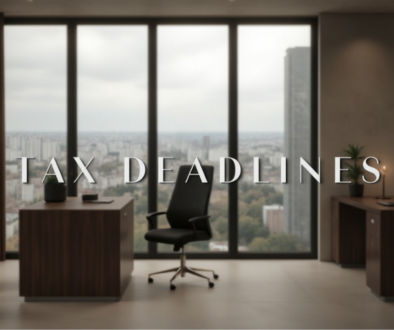Real Estate Tax Tips During the Coronavirus Pandemic: Part VI
By Andrew Gradman, Esq.
Trusted Advisor at AB FinWright LLP (www.abfinwright.com) and Founder at Gradman Tax (www.gradmantax.com)
Accepted for publication in the CEB Real Property Law Reporter; reprinted with permission. The published version will reflect new developments and may contain proofreading and other changes. The author thanks Michael Wiener for comments.
This article is the final of a six-part series titled Real Estate Tax Tips During the Coronavirus Pandemic which describes selected deadline extensions and tax refund opportunities relating to real estate and the coronavirus pandemic.
- Introduction and overview of disaster relief provisions
- Net Operating Loss (NOL) Carrybacks (IRC §172)
- Limitation on Excess Business Losses (IRC §461(l))
- Depreciation of Qualified Improvement Property (QIP)
- Business Interest Limitation & Method for Amending Returns
- Deadlines for Qualified Opportunity Zones (IRC §1400Z-2), Like-Kind Exchanges (IRC §1031), Deadlines for Involuntary Conversion (IRC §1033), Deadlines for Low-Income Housing Tax Credits (LIHTC)
We hope you find these article written by Andrew Gradman very helpful. As always, please feel free to reach out to our office at (310) 237-3070 for a consultation on how these opportunities and provisions may help you.
Deadlines for Qualified Opportunity Zones (IRC §1400Z-2)
Under normal circumstances, the qualified opportunity zone (QOZ) regulations provide that operating subsidiaries of Qualified Opportunity Funds (QOFs) have 31 months to consume their working capital assets and 12 months to reinvest returns of capital. However, if the QOZ is in a disaster area, the 31-month safe harbor may be extended by 24 months and the 12-month reinvestment period may be extended by 12 months. See Treas Reg §§1.1400Z2(d)-1(d)(3)(v)(D), 1.1400Z2(f)-1(b)(2). In the opinion of the Opportunity Zones Working Group (a consortium of interested parties who work together to make technical recommendations) as stated in an April 7, 2020 letter to the Treasury Department, “this regulatory relief is automatic, meaning QOFs and QOZBs [qualified opportunity zone businesses] are not required to request such relief.” However, this interpretation is not obvious. The regulations say only that projects “may receive up to an additional” 12 or 24 months. Treasury should clarify.
In its April 7, 2020 letter, the Opportunity Zones Working Group also requested several other extensions and clarifications, including:
- Currently a taxpayer has 180 days from recognizing a gain to make an investment in a The Working Group requested a 6-month extension in cases when the last day would otherwise fall after the January 20, 2020 disaster declaration.
- Currently, when property is contributed to a QOF, the QOF has a limited time to convert the property into qualifying property before it counts towards the “90% standard” and potentially incurs a penalty. The Working Group requested a six-month extension.
- Currently, when a QOF or subsidiary acquires real property, it has 30 months to “substantially improve” that property. The Working Group requested a 12-month extension, for a total of 42 months.
The Service ultimately issued IRS Notice 2020-23, but it fell far short of these requests. It only addresses the first item (the 180-day investment window); only extended deadlines which would otherwise expire on or after April 1, 2020; and only extended these through July 15, 2020.
Deadlines for Like-Kind Exchanges (IRC §1031)
Within 45 days of selling relinquished property in a deferred exchange, the taxpayer must narrow the list of possible replacement properties (the “identification period”). Then, within 180 days of the sale, the taxpayer must buy one or more properties on that list (the “exchange period”). See IRC §1031(a)(3); Treas Reg §1.1031(k)-1. Similar deadlines apply for reverse exchanges. See Rev Proc 2000-37, 2000–2 Cum Bull 308 as modified by Rev Proc 2004-51, 2004–2 Cum Bull 294.
To the extent any of these deadlines falls on or after April 1, 2020, Notice 2020-23 grants an extension to July 15, 2020. However, it is also important to understand what the Notice does not do:
- It does not protect a taxpayer who fails to observe any of the other requirements of a §1031 exchange (for example, by taking receipt of the sales proceeds);
- It does not modify the written contract which prevents the taxpayer from withdrawing cash from the Qualified Intermediary during the 180-day exchange period;
- Additional guidance might be needed to explain how taxpayers can avoid being in “constructive receipt” of the sales proceeds between the end of the original exchange period (as reflected in the contract) and the end of the extended exchange period (under Notice 2020-23); and
- It does not appear to incorporate the additional extensions described in §17 of Rev Proc 2018–58 (e., a flat 120-day extension for all taxpayers whose deadlines fall after the January 20, 2020 disaster date). The text here is not perfectly clear, and the IRS should clarify its position.
Deadlines for Involuntary Conversions (IRC §1033)
No special extension has been announced for IRC §1033 property conversions. If taxpayers anticipate missing their year-end deadlines, they should seek an extension under existing procedures.
Generally, tax is imposed on the receipt of compensation for the “involuntary conversion” of property, meaning its destruction, theft, seizure, requisition, or condemnation. Under IRC §1033, this tax may be avoided by acquiring property that is “similar or related in service or use” to the converted property by the last day of the year two years after the year of conversion. For example, for calendar year taxpayers whose property was converted anytime in 2018, the replacement property must be purchased by December 31, 2020. Unlike §1031 exchanges (and like QOZs), the taxpayer can spend the conversion proceeds on something else in the meantime. Come December, these taxpayers will need an extension.
Although IRS Notice 2020-23 does not address these deadlines, a case-by-case procedure for requesting extensions already exists. See IRC §1033(a)(2)(B)(ii); Treas Reg §1.1033(a)-2(c). Extensions are generally for a period not exceeding one year, and require reasonable cause.
Unless Treasury issues specific guidance, taxpayers should at least be prepared to describe an economic hardship traceable to the disaster.
Deadlines for Low-Income Housing Tax Credits (LIHTC)
Many jurisdictions have temporarily delayed eviction of tenants during lockdown periods. When evictions resume, COVID–19 will have a devastating impact on housing insecurity. See Coronavirus and Housing/Homeless at nlihc.org for updates and recommendations.
For the low-income housing tax credit, guidance appears at Rev Proc 2014-49, 2014-37 Int Rev Bull 535 (LIHTC) and Rev Proc 2014-50, 2014-37 Int Rev Bull 540(private activity bonds). A disaster declaration is generally not sufficient to trigger relief; these decisions are now in the hands of the appropriate state agency. In an April 8, 2020 letter, the National Association of Home Builders wrote to Treasury requesting a variety of extensions. Treasury has yet to respond.




